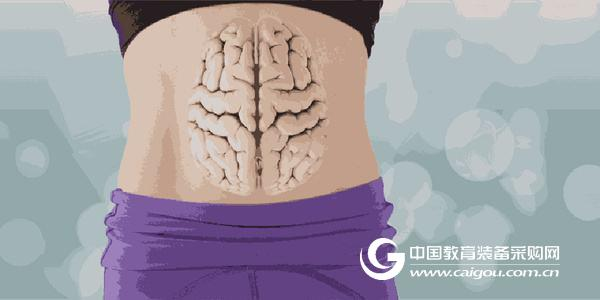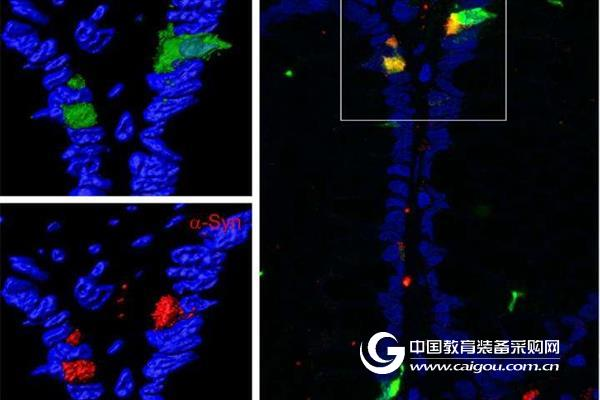Recently, researchers at Duke University have discovered a protein closely related to Parkinson's disease in human and mouse intestinal endocrine cells - α-synuclein (α-synuclein). Provides new insights into the important role that the gut plays in Parkinson's disease. Parkinson's disease (PD) is a common neurodegenerative disease. The death of nigrostriatal dopaminergic neurons, the reduction of dopamine (DA) secretion and the formation of Lewy bodies are important pathological features of Parkinson's disease. Recently, scientists have frequently linked this brain disease to the intestines. Intestinal microbes, or the vagus nerve that connects the stomach and brain, seem to be closely related to Parkinson's disease. However, scientists are still unclear about how the environment or bacteria in the gut eventually lead to the symptoms of Parkinson's disease - tremors, stiffness and walking disorders. Recently, researchers at Duke University have discovered a potential new mechanism in human and mouse intestinal endocrine cells. A protein called α-synuclein (α-synuclein) is present inside these cells. α-Synuclein is mainly distributed in the presynaptic membrane of nerve cells and is a protein closely related to the development of Parkinson's disease. Under certain conditions, α-synuclein misfolds in the cells of the central nervous system to form Lewy bodies, producing abnormal aggregation and accumulation, which leads to cell damage and is considered to be one of the main causes of dopaminergic neuron death. In a study published in the Journal of Clinical Investigation, colleagues at Duke University and the University of California suspected that a substance in the gut might interfere with alpha-synuclein in intestinal endocrine cells, causing them to fold incorrectly. "There is a lot of evidence that the intestinal nerves have been found before the misfolded alpha-synuclein in the brain, but it is unclear exactly where this misfolding occurs," said Rodger, senior author of the study. Professor Liddle said, "This study is another evidence supporting the hypothesis that Parkinson's disease originated in the intestine." Intestinal endocrine cells communicate directly with nerve cells But how do these proteins enter the nervous system through intestinal endocrine cells? This is a problem. Liddle and colleagues sought answers in an article published in the Journal of Clinical Investigation in 2015. Although the main function of enteroendocrine cells is to regulate digestion, researchers at Duke University have found that these cells also have neuron-like properties. Liddle said that these endocrine cells do not use hormones to communicate indirectly with the nervous system, but are physically connected to neurons, providing a pathway for communication with the brain. In a time-lapse video from the 2015 Journal of Clinical Investigation, the researchers demonstrated this striking finding that endocrine cells are placed near neurons, and in just a few hours, endocrine cells move toward neurons. And establish information communication. The researchers were shocked by the findings because endocrine cells are not neurons, but they show the characteristics of neurons. This suggests that endocrine cells can communicate directly with the nervous system and brain. With the new discovery of α-synuclein in endocrine cells, researchers have now explained how non-neuronal cells of neuron-like cells spread malformed proteins from the gut to the nervous system. Intestinal endocrine cell α-synuclein may help early diagnosis of Parkinson's disease They plan to collect and examine the enteroendocrine cells of Parkinson's patients to see if they contain the wrong or abnormal alpha-synuclein. Liddle said that new clues about the protein could help scientists develop biomarkers that can diagnose Parkinson's disease earlier. The study can also help develop treatments for alpha-synuclein. Scientists have been looking for treatments that can prevent alpha-synuclein abnormalities, but most of the research is still in its early stages. "Unfortunately, there is still no effective treatment for Parkinson's disease," Liddle said. "Imagine that if you can diagnose early, there may be a way to prevent the misfolding of alpha-synuclein." Shanghai Chuangsai Technology has excellent performance, interleukin cytokines, fetal bovine serum, electrophoresis equipment scientific instruments, raw material drug standards, chemical reagents, cell culture consumables, Shanghai Chuangsai, mass products special promotions, welcome to inquire! Guitar Bag,Classical Guitar Bag,Folk Pop Guitar Bag,Electric Guitar Bag Dongguan Mingpin Traveling Appliance Company , https://www.mpluggage.com
